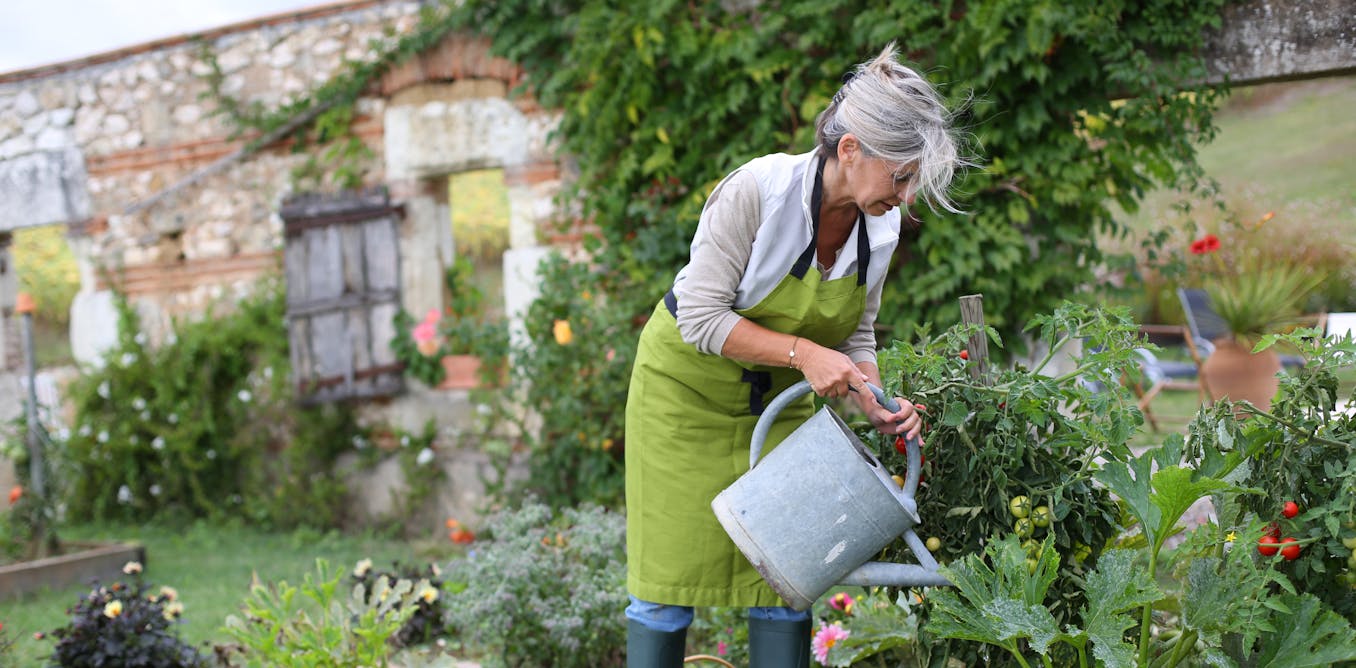[ad_1]
Because the climate warms and days lengthen, your consideration could also be turning to that forgotten patch of your yard. This week we’ve requested our consultants to share the science behind gardening. So seize a trowel and your inexperienced thumbs, and dig in.
“That’s all very nicely put,” says Candide, within the ultimate line of Voltaire’s novel of the identical title, “however we should go and work our backyard.”
I studied this textual content at highschool earlier than I grew to become a gardener {and professional} horticulturist. We had been taught that Candide’s gardening crucial was metaphorical not literal; a command for locating an genuine vocation, not a name to take up trowels and secateurs.
Actually, Voltaire himself actually believed that energetic gardening was an effective way to remain sane, wholesome and free from stress. That was 300 years in the past.
Because it seems, the science suggests he was proper.
The science of therapeutic horticulture
Gardens and landscapes have lengthy been designed as sanctuaries and retreats from the stresses of life – from nice city inexperienced areas similar to Central Park in New York to the humblest suburban yard. However past the passive enjoyment of a backyard or of being in nature extra typically, researchers have additionally studied the position of actively caring for vegetation as a therapeutic and academic device.
“Therapeutic horticulture” and “horticultural remedy” have grow to be recognised therapies for stress and despair, which have served as a therapeutic help in settings starting from prisons and psychological well being therapy services to varsities and hospitals.
Gardening and college
Research of college gardening applications – which often centre on rising meals – present that college students who’ve labored on designing, creating and sustaining gardens develop extra optimistic attitudes about well being, vitamin and the consumption of greens.
In addition they rating higher on science achievement, have higher attitudes about college, and enhance their interpersonal expertise and classroom behaviour.
Analysis on college students confirms that gardening results in larger ranges of shallowness and duty. Analysis means that incorporating gardening right into a college setting can increase group cohesiveness.
Gardening and psychological well being
Tailor-made gardening applications have been proven to extend high quality of life for folks with power psychological diseases, together with nervousness and despair.
One other research on the usage of therapeutic horticulture for sufferers with medical despair sought to grasp why gardening applications had been efficient in lessening affected person expertise of despair. They discovered that structured gardening actions gave sufferers existential goal. Put merely, it gave their lives that means.
In jails and corrective applications, horticultural remedy applications have been used to provide inmates optimistic, purposeful actions that reduce aggression and hostility throughout and after incarceration.
In a single detailed research from a San Francisco program, involvement in therapeutic horticulture was notably efficient in bettering psychosocial functioning throughout jail populations (though the advantages weren’t essentially sustained after launch.)
Gardening has been proven to assist enhance the lives of navy veterans and homeless folks. Varied therapeutic horticulture applications have been used to assist folks with studying difficulties, asylum seekers, refugees and victims of torture.
Gardening and older folks
As populations within the West age, hands-on gardening applications have been used for older folks in nursing houses and associated services.
A scientific evaluation of twenty-two research of gardening applications for older adults discovered that gardening was a strong health-promoting exercise throughout numerous populations.
One research sought to grasp if sufferers recovering from coronary heart assault may profit from a horticultural remedy program. It concluded:
[Our] findings point out that horticultural remedy improves temper state, suggesting that it might be a useful gizmo in lowering stress. Due to this fact, to the extent that stress contributes to coronary coronary heart illness, these findings help the position of horticultural remedy as an efficient element of cardiac rehabilitation.
Whereas the literature on the optimistic results of gardening, reflecting each qualitative and quantitative research, is giant, most of those research are from abroad.
Funding in horticultural remedy applications in Australia is piecemeal. That mentioned, there are some standout success tales such because the Stephanie Alexander Kitchen Backyard Basis and the work of nurse Steven Wells on the Royal Talbot Rehabilitation Centre and past.
Lastly, with out professionally skilled horticulturists none of those applications – in Australia or internationally – can happen.
[ad_2]
